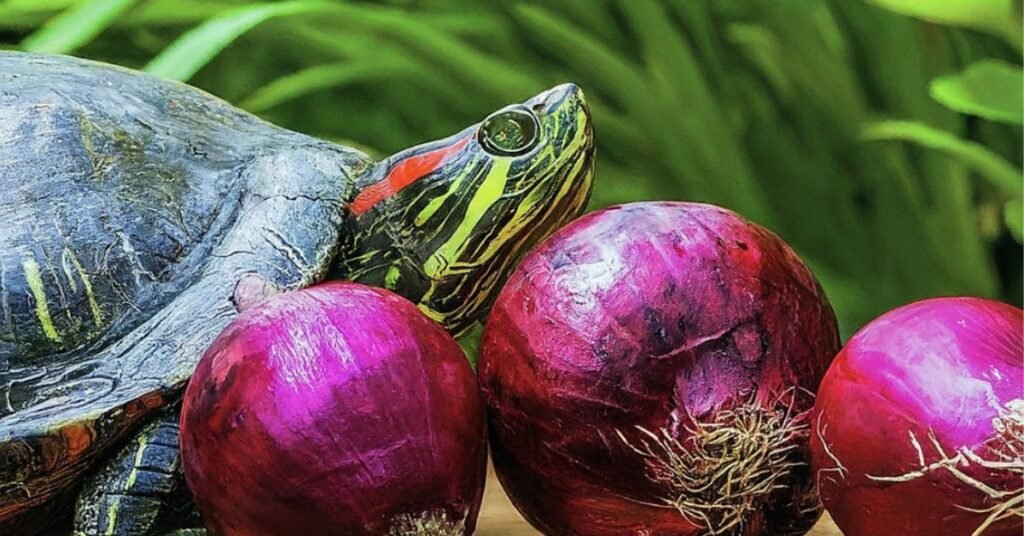Onions are one of the most common vegetables or salad alternatives in many households. Many new turtle owners become confused about what to feed their turtle and what not. So, as an available vegetable, you may wonder – can turtles eat onions? While turtles are known for their varied diet, not all vegetables are safe for them.
Onions, for instance, are not recommended for turtles due to their harmful effects. As onions are high in acidity and contain toxic compounds like thiosulfate, they can cause health problems for turtles. So, today, to fulfill your query, we will dig down to this question: can turtles eat onions? If not, why?
Can Turtles Eat Onions?

Onions are not safe for turtles to eat. They are harmful due to their acidic nature and compounds like thiosulfate, which can damage a turtle’s red blood cells and lead to serious health issues such as Anemia. It’s crucial to avoid feeding onions to turtles and instead focus on providing them with safe and nutritious foods.
Are there Any Nutritional Benefits of Onions for Turtles?
Onions have many positive ingredients, but they are lesser in quantity for turtles. Let’s see what onions contain for nutritional benefit –
Rich in Vitamins
Onions are packed with various vitamins that can potentially benefit turtles. They contain Vitamin C, which is essential for supporting the immune system and overall health. This vitamin may help to promote tissue repair and fight common illnesses.
Essential Minerals
In addition to vitamins, onions provide essential minerals like potassium and folate. Potassium is crucial for maintaining proper muscle function and heart health in turtles. It helps maintain electrolyte balance, which is vital for bodily functions. On the other hand, folate is essential for cell division and growth so turtles can grow and thrive.
Potential Health Support
The presence of these nutrients will make you think that onions can help turtles. Minerals and vitamins in onions might help turtles boost their metabolic processes and strengthen their immune systems. Despite these potential benefits, it’s essential to avoid onions from turtles’ diet because there are risks beyond the benefits.
Nutritional Content of Onions (Per 100 Grams)

The following is the list of nutritional ingredients of onion:
| Nutrient | Amount |
| Calories | 40 |
| Water | 89% |
| Protein | 1.1 g |
| Carbs | 9.3 g |
| Sugar | 4.2 g |
| Fiber | 1.7 g |
| Fat | 0.1 g |
| Vitamin C | 7.4 mg |
| Folate | 19 mcg |
| Vitamin B6 | – |
| Potassium | 146 mg |
From the above table, we see onions contain some ingredients, like vitamin C, folate, potassium, and fiber, that are necessary for turtles’ bodies. But they contain significantly less. Some negative ingredients are sugar and carbohydrates, which can badly impact turtles.
Are there Any Risks to Feeding Onions to Turtles?
Yes, there are. The truth is that risky or harmful elements are more in onions than positive ones in turtles.
Anemia and Blood Cell Damage
Feeding onions to turtles can lead to anemia due to compounds like sulfur and n-propyl disulfide. These elements harm red blood cells, reducing their ability to carry oxygen. N-propyl disulfide is the primary toxic element in onions. Anemic turtles may show signs such as lethargy and pale mucous membranes. They have a low number of red blood cells or hemoglobin, which lowers their oxygen levels.
Metabolic Bone Disease
Onions contain high levels of phosphorus, which disrupts calcium absorption. This imbalance can lead to metabolic bone disease, which can weaken a turtle’s bones and shell. Bone disease symptoms include soft shells and difficulty moving.
Digestive Issues
Turtles consuming onions might experience digestive problems due to their acidic nature. It can result in symptoms like diarrhea or loss of appetite. If a turtle stops eating, it may indicate gastrointestinal distress.
Acidic Reactions
Onions contain high levels of acidic compounds like L-ascorbic acid and pantothenic acid. These potent acids can severely affect turtles and cause discomfort. This may include heartburn and an uncomfortable feeling in the mouth and throat. In severe cases, this can lead to breathing difficulties and even death.
Symptoms of Onion Toxicity
Look out for signs of onion toxicity in turtles, such as lethargy, regurgitation, or discolored urates. If these symptoms occur, immediate veterinary attention is necessary, as they can indicate serious health issues.
Should You Serve Onions to Your Turtles at All?

Turtles should not be served onions. Onions contain a compound called n-propyl disulfide, which is toxic to turtles, as we have already mentioned above. It can rupture red blood cells, causing severe health problems like Anemia. Onions can cause turtles digestive issues even in small quantities, and they can be dangerous in large amounts.
As a general rule, avoid feeding turtles any plants from the allium family, which includes onions, garlic, and chives. These plants all contain n-propyl disulfide and can be harmful to turtles. The diet of turtles should be carefully managed to ensure it contains healthy, nutritious options.
What Should You Do If Your Turtle Eats Onions Accidentally?

If your turtle happens to nibble on some onions, it’s important not to panic. First, check for your turtle’s reaction. Onions can cause digestive issues and other health problems for turtles, so it’s wise to act promptly.
However, if a turtle eats a small piece of onion accidentally, there will be no issue. If your turtle shows any reaction, you should contact a vet for professional advice. Meanwhile, you can offer your turtle some safe foods like cucumber or lettuce, which may help move the onion through their system more smoothly. Keeping an eye on your turtle for any signs of distress is also a good idea to ensure their well-being.
Food Alternatives to Onions for Turtles
If you want to feed your turtle safely, there are plenty of options that don’t involve onions. Here are some great alternatives:
- Zucchini: A soft and easy-to-digest vegetable that’s perfect for turtles.
- Sweet Potatoes: Rich in vitamins and minerals, they offer a sweet, nutritious treat.
- Green Beans: Packed with fiber and vitamins, these are a crunchy and safe choice.
- Papaya: This tropical fruit is not only delicious but also full of beneficial nutrients.
- Cucumber: With high water content, cucumbers are refreshing and hydrating for turtles.
- Mango: An occasional treat, mangoes provide a burst of flavor and essential vitamins.
Can You Offer Cooked Onion To Turtles?
While it might seem tempting to share cooked onions with your turtle, onions— whether raw or cooked—aren’t a safe snack for turtles. These veggies contain acidic elements and compounds like thiosulfate, which can wreak havoc on a turtle’s health. So, it is best to keep onions off the menu for your pet turtle.
Can Box Turtles Eat Onions?
Box turtles should not eat onions, which contain n-propyl disulfide, a compound harmful to turtles. This toxin can cause red blood cell rupture, leading to severe health problems like anemia. The n-propyl disulfide in onions disrupts the oxygen-carrying capacity of red blood cells.
Can Turtles Eat Green Onions?
Like onions, green onions are bad for turtles. They belong to the allium family, which includes garlic and Onions, and are generally toxic to turtles. Additionally, consuming green onions can result in digestive issues for turtles, such as Diarrhea and loss of appetite. To ensure turtles’ health and well-being, it’s always best to avoid feeding them any plants from the allium family.
Can Box Turtles Eat Green Onions?
Box turtles should avoid green onions. The compound n-propyl disulfide found in green onions can damage red blood cells, potentially leading to Anemia. Eating green onions can also upset a box turtle’s digestive system.
Can Box Turtles Eat White Onions?
Box turtles should definitely avoid white onions. Being part of the allium family, these onions pose significant health risks to them. They contain compounds like sulfur and phosphorus, which can harm a turtle’s red blood cells.
Additionally, high phosphorus levels can interfere with calcium absorption, which increases the risk of metabolic bone disease. Another negative reason is that having onions can cause digestive issues.
Read More: Can Turtles Eat Raspberries?
Wrapping Up
If you are looking for the question, “Can turtles eat onions?” The short answer is no. The compounds in onions, garlic, and leeks can be pretty harmful to turtles. These substances (n-propyl disulfide or sulfur) can damage red blood cells and lead to serious health problems.
Such as Anemia, digestive issues, and even metabolic bone disease due to disrupted calcium absorption. Keeping your turtle’s diet free from harmful foods like onion ensures their well-being and happiness.
